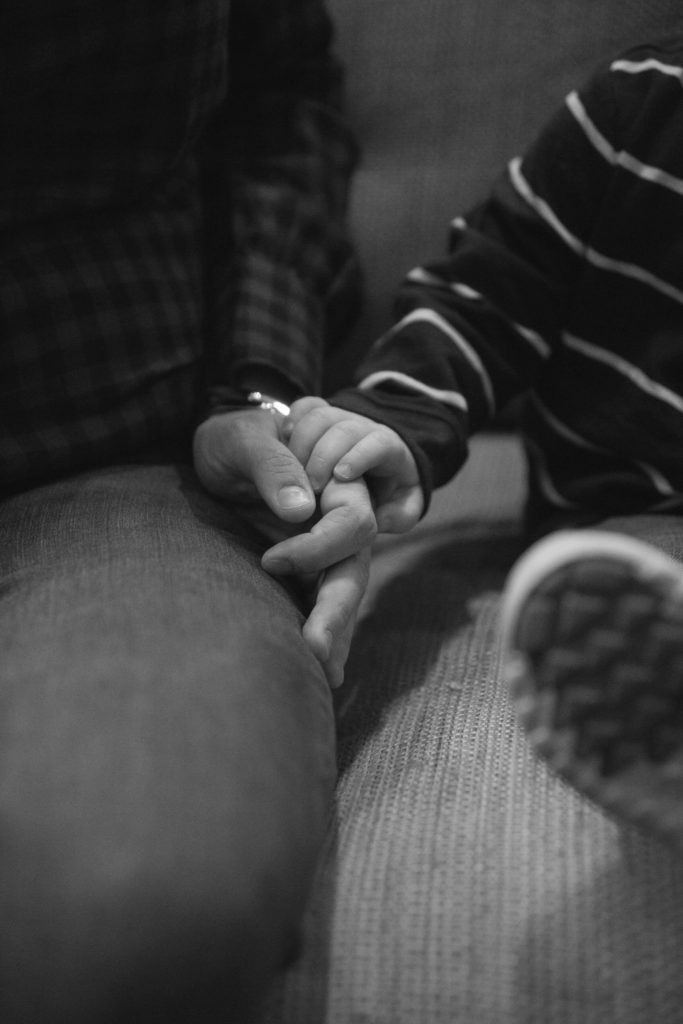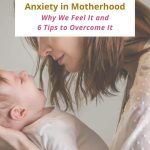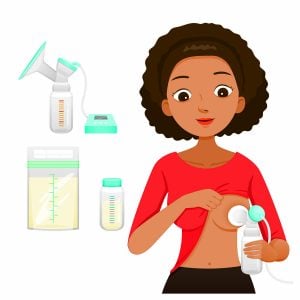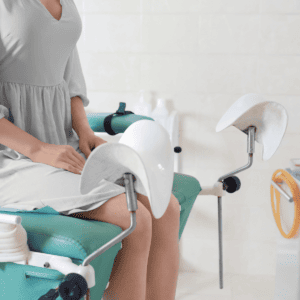The pressure to be a perfect mom begins long before we have children. Perhaps it’s when we’re playing with dolls as children, or maybe in those moments when we’re simply reminded that we live in a society that makes us feel pressure to be a mom in the first place.
I remember attending a wedding, a year into unsuccessfully trying to conceive, and 4 different people asking when we were going to have a baby. It was assumed that I would have one, and that I would have one easily. I never could have foreseen the recurrent miscarriage journey that lay ahead.
But even more, I find it remarkable that I wasn’t even pregnant yet, and people were already pushing me in ways that made me feel anxiety in motherhood.
I’m an anxious person by nature; mental health has been a struggle for me long before I worried about the connection between mental health and parenting. I’ve talked previously about what it’s like living with anxiety and how to deal with postpartum anxiety.
But I can’t help but wonder, if the societal pressure to conceive had been less pervasive, would I have felt less pressure?
Would I have been less stressed during the fertility process?
Would I now experience less anxiety in motherhood?
I believe the answer is yes.
Less social pressure about motherhood, in general, would lessen my own anxiety. I’m convinced of it.
In this article, I’ll explore the social pressures mothers face and how these pressures lead to anxiety in motherhood that could be lessened significantly. We’ll look at:
- The historical reasons behind anxiety in motherhood;
- The special realm of hell (for me), known as new parenthood;
- Whether or not motherhood gets easier; and
- 6 tips for how you can be a joyful, yet still anxious, mama

This site contains affiliate links, meaning that we earn a small commission for purchases made through our site. We only recommend products we personally use, love, or have thoroughly vetted.
Where Does Anxiety in Motherhood Come From?: A Historical Look at Motherhood
Let’s go down a historical rabbit hole for a minute. I promise, it’s taking us somewhere important.
I wrote my doctoral dissertation on motherhood in Victorian Britain (1837-1901). Because the Industrial Revolution was happening at this time, printing became cheaper, and literacy rates massively increased.
There was suddenly a mass proliferation of print materials that had never existed before, and so many of these printed materials focused on telling mothers exactly how to do their jobs.
Magazines, newspapers, religious tracts, and medical pamphlets proliferated, all telling women that they must become mothers and how to mother best.
Of course, most of this material was contradictory, and almost all of it was written by men.
Connections between Victorian Britain and Today
As I dug through documents in the British Library while working on my dissertation, I was infuriated by all the conflicting advice I read.
And I began to notice how much this feels like our current moment.
With the rise of the Internet over the past two decades, we’ve seen a new mass proliferation of material–again, often conflicting–telling women to mother and how to mother.
It’s separated us into various parenting style camps.
Breast or bottle?
Co-sleep or crib?
Feeding schedule or on-demand?
And these are just a few of the dichotomies that pop up during the postpartum phase.
How many more divisive camps of motherhood can there possibly be in my lifetime?
The various camps (and everyone’s damn opinions about them) feel endless, and it causes me–and so many other moms–a lot of anxiety.
New Parenthood and Anxiety
Ahh, new parenthood. The days I don’t miss. Like, at all.
There are a lot of people out there who love the newborn baby stage, but those people are very different from me. If you’re one of them and want to help me understand, please, I beg of you, teach me your ways.
Here’s the thing. My postpartum experience was riddled with a number of issues:
- The health struggles that come with making sure preeclampsia remains at bay after birth
- An incredibly difficult, seemingly impossible time dealing with postpartum depression and anxiety
- A bigger desire to breastfeed than I ever expected, with a newborn with a recessed chin who couldn’t latch. So, exclusive pumping + lactation consultant visits + exercises for Jack until I eventually decided it was time to exclusively pump until his jaw grew
- A massive identity crisis after motherhood
- Oh, and mom guilt. SO. MUCH. GUILT. Because when you’ve spent years going through infertility, recurrent miscarriage, every procedure under the sun, shots, hormones, chemicals, and more, you feel like you’re supposed to be abundantly thankful for and excited about your baby. And when you don’t feel that way, dear God do you feel the guilt.

Please hear me, infertility warriors.
Postpartum is hard. You are allowed to feel how hard it is. You are not ungrateful. You are not forgetting your sisters still in struggle. You are simply going through your own struggle, and that’s okay.
Unfortunately, infertility moms tend to feel the pressure to be a perfect mom even more than most. For many of us, that leads to massive guilt and anxiety in motherhood.
“Does motherhood get easier?”
This is the question I found myself asking frequently during early motherhood.
I adore Jack. Seriously, he’s the best, most amazing, coolest, cutest, funniest, sweetest, best thing ever.

But my anxiety in motherhood, especially in the early days, definitely led me to question whether I was actually cut out for this motherhood thing.
So while this is a super complicated question, my answer to it (though I admittedly only have a 2-year-old) is yes. Motherhood does get easier. It’s certainly easier now that Jack is 2 and not a tiny, squawling newborn.
BUT, and it’s a big but–I had postpartum anxiety. I no longer have postpartum anxiety. So I don’t think it’s that motherhood actually gets easier; I think I just got much better at handling it.
Undefining Motherhood’s Readers Said…
I’ve developed a pretty fool-proof method for answering these tough questions: poll the audience.
Because you, dear readers, most certainly cannot be wrong, right?
The interesting thing was that you said…
78% of respondents said motherhood does not get easier.
The more nuanced and logical answer: some things get easier, while others get harder.
Things that get easier are often adjustments to yourself–better familiarity with your child’s personality and routine; you know yourself better; you develop more patience (if you’re lucky).
And some of it has to do with your kids. Mostly, their increasing independence as they get older means you’re less necessary for every menial task.
Then again, their increasing independence requires even more vigilance, and often patience, from you. Like 10 minutes ago, when Jack took his poopy diaper off in a chair because he didn’t want to wear it anymore.
0 points for increased independence.

So that’s one of those things that goes into the category of “gets easier and gets harder.” Which, quite frankly, I think is true of nearly everything.
Things you all said get harder about motherhood: greater guilt, dealing with never-ending sickness, communication, and dealing with kids’ attitudes.
Yep. Sounds about right.
Toddler Mom Anxiety and Why Social Pressure Makes it Harder
Now that Jack is a toddler, I’m simply experiencing different reasons to feel anxiety in motherhood. Toddlerhood, for me, has been when my postpartum anxiety lessened.
But, it’s when I’ve seen the biggest time when I’ve seen my anxiety flare up as a direct result of social pressures around me.
Before, it was postpartum anxiety. Now, the pressure comes from the outside.
I’m gonna lay it all out for you. Here’s what I’ve stressed/am stressing about now that Jack is a toddler:
I stressed so much over how to wean my toddler off a bottle when people around me kept telling me Jack was too old to drink from one.
I realize in hindsight that I wasn’t actually that concerned about Jack’s bottle habit. But everyone else said I should be, so insert parenting anxiety.

I was tremendously freaked out by whether Jack was meeting his speech milestones, in part because of a latent anxiety rooted in my own speech problems as a child.
Because I spent years in speech therapy, being embarrassed when I was pulled out of class for it, I worried that Jack would need it too. I watched his speech milestones like a hawk, constantly asking those who were around him and familiar with early childhood speech, “Does my child need speech therapy?”
The parenting anxiety about Jack’s speech was self-induced, mostly because I wanted him to get the earliest possible intervention if he needed it. The anxiety about the bottle, on the other hand, came from social pressure. We need to learn to do better with both.
There is no excuse for anyone to feel pressure to be a perfect mom or raise a perfect child.
Pressure from Parenting Books
Then, there are the pressures from parenting books that produce oh so much anxiety in motherhood. Oh, parenting books.
Seriously, I need advice on how to get through certain stages, and I love that parenting books can provide that. But they also have an uncanny ability to riddle you with parenting guilt.
I’m thinking specifically of when we were experiencing potty training problems. Jack showed every sign of readiness for potty training, and yet, when we tried it, it was clear he wasn’t ready.
But every damn book I’d read insisted that once you start, you cannot stop. In case you haven’t read my story about when to give up on potty training, I’ll spoil it for you.
This. advice. is. bullshit.
That’s actually the entire problem at hand.
So much of the advice we receive is utter BS because it is not catered to us, our lives, our children, our needs.
Yet when we constantly have voices in our ears (or coming through written word) telling us how to parent, and that advice doesn’t fit our personalities, our children, or our lifestyles, we begin to feel a lot of anxiety in motherhood.
I know this will continue as Jack gets older, but I can’t speak for moms of older children because I’m not one. Although Tessa recently talked with us about dealing with anxiety as a mom of elementary-aged kids, and it was pretty enlightening.
How Can I Be A “Happy” Mom?
I think it’s clear that I can’t teach you to be a mom who isn’t stressed or anxious. I will never be a mom who is neither stressed nor anxious. Also, I’m not a mental health professional, or a miracle worker. Sorry!
People tend to wonder how to be a happy mom, but I think “happy” is the wrong goal. I think we should strive for joy. Joy is deeper, more rooted, and something we can feel during and despite stress and anxiety.
So maybe the question is, “How can I be a better-stressed mom who is able to feel joy despite anxiety?” Perhaps we can feel anxiety in motherhood and still experience tremendous joy in it.
No perhaps needed, actually. Because yes, we can. I do it daily.
So that, I can help you with. Because I know a lot about anxiety and trying to stay joyful despite it.
6 Tips for Being a Joyful, Still–Sometimes-Stressed Mama
1.) Learn your stress signs.
My stress signs include clinching my jaw and tightening just about any muscle in my body (but especially my hands, shoulders, hips, thighs, and feet.)
Other stress signs might include shortness of temper, a raised voice, heavier breathing, a rapid heart rate, irritability, quickness to judge.
(Use your wearable technology to help here. If you have something on your wrist that tells you your heart rate, it’s constantly monitoring for a major stress sign.)
Anxiety can make you snappy. It does me!
But when you learn the physical ways that stress manifests in your body, you can step away and be snappy somewhere else.
Like in your walk-in pantry. As you scream a little. Oh, come on, we’ve all done it. Well, those of us who have a walk-in pantry, which I don’t, so I go to the hall bathroom. But you get the point.
2.) When you recognize a stress sign, take a break as soon as possible.
I know. If you don’t want to laugh at me, you want to punch me. But hear me out.
A break doesn’t have to mean you get away from your kids. It might mean 30 seconds of intentional, deep breaths. It could mean leaving your baby to cry in the crib for 3 minutes while you go into the closet and relish silence.
Or, it might be that quick pantry break we just talked about.
If you’re lucky, or it happens at the right time, maybe you can excuse yourself, take 10, go to the store, etc. But there are small ways to take breaks when you’re desperate.
And yes, I know, you are desperate. It’s okay. You’ve got a whole family of desperate parents doing this thing too.
3.) If you have a partner, remember they’re stressed too.
We tend to feel like our partners don’t understand our problems, but the reality is that, when you’re stressed and short of temper, you’re likely taking things out on each other anyway.
Give them some grace and/or space and ask them to extend you the same courtesy.
Reducing the amount of conflict/number of arguments with your partner WILL decrease your overall stress levels.
4.) Practice self-care.
Again, please don’t punch me. Throughout this article, we’ve linked to a place where you can download our 10 ideas for FREE self-care.
So don’t talk to me about how self-care is an indulgence. It can be, but there are ways to work it into your life that work for most (admittedly, not all) people.
Also, check out our post on self-care for moms. It’s super helpful on this point.
5.) Exercise
However, you can do this.
Maybe it’s a class, or maybe it’s as simple as a walk with the stroller, or walking up and down the stairs. Whatever you can work in, it’ll help you blow off steam.
This is my biggest weakness from this list, but I’m working on it.
6.) Find joy in the simple things.
It sounds cliché, I know, but hear me out.
When you hear your child giggle, stop for a moment and giggle with her.
When your toddler brings you a leaf from outside (as Jack does now every time he goes outside), smile and be grateful for that fall leaf your baby brought you. I take it from him, thank him, smell it, offer to let him smell it, and spend a moment feeling grateful that my baby wants to do something nice for me.

Not every mama moment is joyful, let’s be real.
Most of them are filled with the social pressures brought about by other people’s opinions and unnecessary advice.
Others are filled with toddler poop on your favorite chair or worrying about that persistent cough he’s had.
But when you stop to enjoy the little things, that anxiety fades…even if just for a moment.
What’s one way you overcome (or deal with) anxiety in motherhood?











